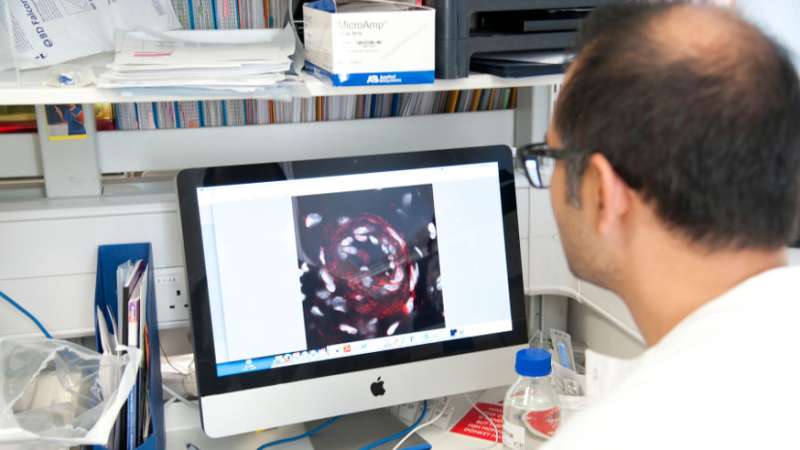'Virtual tumours' predict success of tumour-heating sound waves

Researchers have developed a virtual, computerised cell model that is being used to predict the success of treating cancer with an exciting new tumour-heating technology – which uses targeted sound waves to heat and destroy cancer.
The virtual cells will be used to test the effectiveness of high-intensity focused ultrasound, or HIFU, in combination with radiotherapy. Researchers at The Institute of Cancer Research, London, are testing the technology in preparation for human trials.
In the future, more fully-developed computerised tumour simulations might also predict whether or not a patient might benefit from treatment with a combination of radiotherapy and HIFU.
HIFU heat treatment
HIFU is a new type of treatment being pioneered at the ICR through research led by Professor Gail ter Haar, team leader in therapeutic ultrasound.
It is a non-invasive technique, and due to its ability to deliver precise targeted treatment it does not affect healthy tissue around tumours.
Heating cancer cells also increases their sensitivity to radiation, so combining HIFU with radiotherapy could be an effective way to treat cancer.
Modelling cell response to combined treatments
In a new study published in the Journal of the Royal Society Interface, the research team from the ICR outline how their virtual cells can model the response of cells to heat therapy when used separately, or in combination with radiotherapy.
The researchers, funded by Cancer Research UK and the Focused Ultrasound Foundation, compared their model's predictions with experimental data gathered from treating colorectal cancer cells with a radiotherapy-heat combination.
They found a good association between the predicted outcomes and the effects they saw in the cell lines.
The new model, which was developed in collaboration with the Joint Department of Physics at the ICR and our partner hospital The Royal Marsden NHS Foundation Trust, will play an important role in helping Professor ter Haar's team to refine methods for measuring and calibrating this new technology.
More effective decisions around treatment
Professor Gail ter Haar said:
"Heating cancer cells using HIFU, which we've developed as a potential future treatment at the ICR, might boost the effects of radiotherapy in treatment for patients.
"This study shows that a new 'virtual' tumour that we developed can accurately mimic the response of cancer cells to heat treatment and radiotherapy, simulating how the two treatments work experimentally.
"The model is also an important step for studying future applications of treatments such as High Intensity Focused Ultrasound with radiotherapy, and could ultimately lead to more effective decisions around treatment options for patients."
More information: S. Brüningk et al. Combining radiation with hyperthermia: a multiscale model informed by in vitro experiments, Journal of The Royal Society Interface (2018). DOI: 10.1098/rsif.2017.0681

















